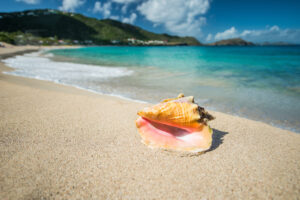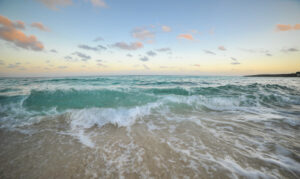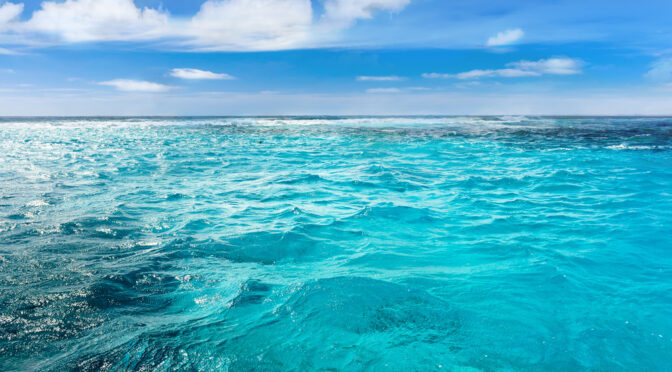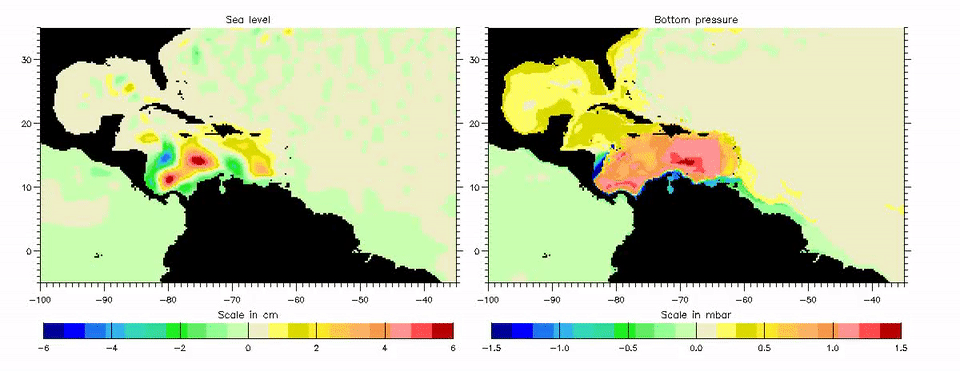The University of Liverpool ocean scientists found an area of the ocean that is reverberating with ‘oscillations of the Earth’s gravity field’ in such a way that they can be ‘heard’ from space.
Despite all of the noise coming from the ocean worldwide, there is a region in the Caribbean Sea where the synchronistic waves are allowing a whistle like effect that is blowing very loudly.
The Caribbean Sea is south-east of the Gulf of Mexico and is part of the Atlantic Ocean. This area has the Caribbean islands, Central America, and South America surrounding it. The region is a very large area of around 1,063,000 square miles (2,754,000 km2).
By measuring the various pressures and sea level readings from the bottom of the ocean in combination with ocean activity spanning over 50 years and observing satellite measurements of gravity the university was able to discover what they are calling the ‘Rossby Whistle’.
The `Rossby Whistle’
This strange phenomenon, or whistle, is created when a large wave moves slowly across the ocean in a westward direction and interacts with the seafloor. While normal waves would cancel each other out this wave is able to die out on the west side of the basin and then reappear on the east side.
This strange wave system is named the ‘Rossby wormhole’ and they are able to hold together and oscillate for a sharply-defined period of time.
A-flat Tone
The water moves in and out of the basin in a cycle that takes 120 years. The massive movement of this wave also changes the  Earth’s gravity field in such a way that we can measure it from a satellite. The whistling itself is actually a very low octave tone far below what we can normally hear and is playing an A-flat.
Earth’s gravity field in such a way that we can measure it from a satellite. The whistling itself is actually a very low octave tone far below what we can normally hear and is playing an A-flat.
“We can compare the ocean activity in the Caribbean Sea to that of a whistle. When you blow into a whistle, the jet of air becomes unstable and excites the resonant sound wave which fits into the whistle cavity. Because the whistle is open, the sound radiates out so you can hear it.” –Professor Chris Hughes, who is an expert of Sea Level Science.
“Similarly, an ocean current flowing through the Caribbean Sea becomes unstable and excites a resonance of a rather strange kind of ocean wave called a ‘Rossby wave’. Because the Caribbean Sea is partly open, this causes an exchange of water with the rest of the ocean which allows us to ‘hear’ the resonance using gravity measurements.”
When you speed up the footage and audio recorded from the ocean it actually makes it high-pitched enough that you can hear what is going on. In the video clip below you can see the measured pressure changes across the region and also hear the tone it produces repeating several times.
Listen to the Whistle Below:
Coastal flooding from this wave
“This phenomenon can vary sea level by as much as 10 cm along the Colombian and Venezuelan coast, so understanding it can help predict the likelihood of coastal flooding.”
As we are able to gather more data about the large-scale cycles of the earth we are more able to predict big weather changes that haven’t happened since before everyone on earth was born.
These seemingly small sea level changes can actually create a great deal of flooding in Colombia. Sometimes it only takes a sea level change of 20 cm in order to create a huge problem for us.
The scientists who studied this phenomenon believe that it may also have an effect on the Northern Atlantic ocean since the Caribbean Current flows in that direction turning into the Gulf Stream. This may be a big core part of the ocean’s climate engine.
Sources-


